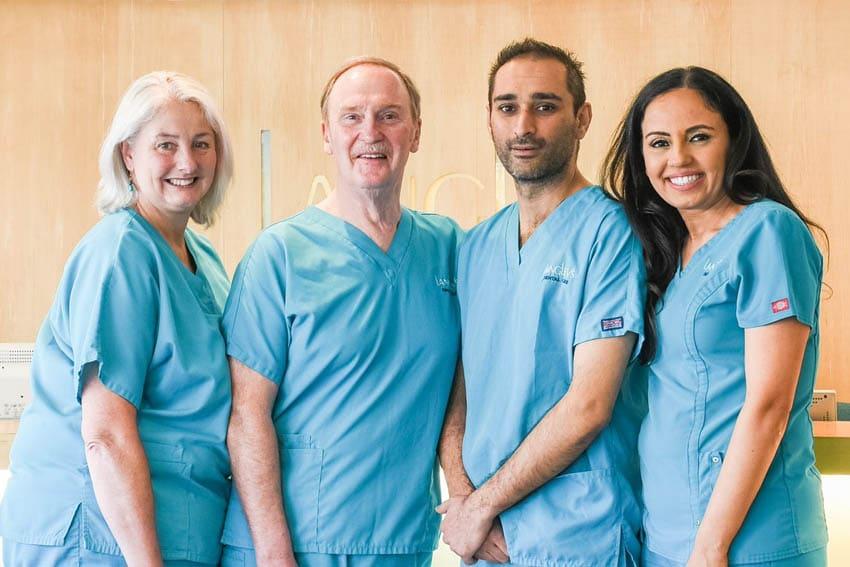
Fillings
A filling may be necessary when a tooth has been damaged due to slight trauma or decay. Left untreated, these issues can become very inconvenient in daily life, and lead to further issues in the future. The most common reason patients may require a filling is due to a minor dental cavity.
The process
Your dentist will first remove any decayed or damaged material from your tooth. They will then thoroughly clean the tooth to ensure there are no remnants left behind. Depending on whether you’d prefer a white or a metal filling, your dentist will then fill the gap with composite resin (white) or silver amalgam.

Bridges
You may need a bridge if multiple teeth have been severely damaged due to decay or trauma. A bridge is comprised of multiple crowns linked to fit together, filling the space left by missing teeth.
The Process
This is very similar to the crown process. The problem teeth will be investigated, then the enamel will be cleaned and shaped to allow for the bridge. Impressions will be taken of your teeth which will be sent to a dental laboratory where a permanent bridge will be created, according to your colour and appearance preferences. In the meantime, a temporary bridge will be put into place to protect your gums and any exposed teeth.
Once the permanent bridge is ready, it will be fixed over the necessary area and your bite will be checked and corrected accordingly.
General dentistry
At Langley’s Dental Centre we are proud to offer a patient-centred, supportive approach to dentistry. Whatever your needs, you can be sure that we’ll always strive to fulfill them in the best way possible for you. General dentistry covers a wide range of routine procedures, including X-rays, diagnostics, fillings, scans, dental hygiene, crowns, bridges and root canal therapy.
Your dental check up
Your initial consultation will involve an assessment of your current oral health. This involves monitoring and screening for underlying health issues and, should you need dental work, advising upon a treatment plan. We will also advise you on the best course of action needed to maintain your oral health, perhaps suggesting a membership plan to encourage this.
Crowns
A crown may be required if your tooth has been damaged due to severe decay or trauma. A crown is a custom-made prosthetic tooth, usually made from porcelain. It is fitted over the site of the damaged tooth, restoring its functionality and appearance. Crowns will not only improve your smile, but also protect your tooth from any further damage.
The process
Initially, we will investigate the damage and then assess the type of crown you’ll need. We’ll then prepare your mouth to create the space and shape that the new crown will take up. This may sometimes, though certainly not always, require drilling your tooth.
We’ll then take impressions of your mouth and discuss the colour and appearance of your crown. This information will then be sent to a laboratory, where they will make the crown. In the meantime, we will put a temporary crown in place so that you don’t have a gap.
Once the crown is made we will fix it in position using a dental adhesive and then check your bite, correcting it if necessary.
Root canal therapy
‘Root Canal’ is actually a term used to describe the natural cavity of the tooth - the space within the enamel at the centre of the tooth. This chamber is where the ‘pulp’ of the tooth sits and is also home to the nerve of the tooth. If this area is damaged due to decay or trauma, the material within (including the nerve in some cases) begins to break down and bacteria begin to multiply within the chamber. This can lead to severe and painful infection or an abscessed tooth, and you may need to have a root canal treatment to remove the cause of the infection.
The process
Your dentist will initially take an x-ray of your mouth to see the extent of the damage done to your root canal. They will then place a rubber dam around the tooth to prevent any saliva from infiltrating the area. An access hole will then be drilled into your tooth, and your dentist will clean away the decayed debris causing the infection.
Depending on the case, your dentist may apply a medication to your tooth after cleaning to stave off any further infection. If they feel that this is unnecessary, they may choose to seal up the tooth straight away.
If you have any questions about our general dentistry treatments, please don’t hesitate to get in touch.


